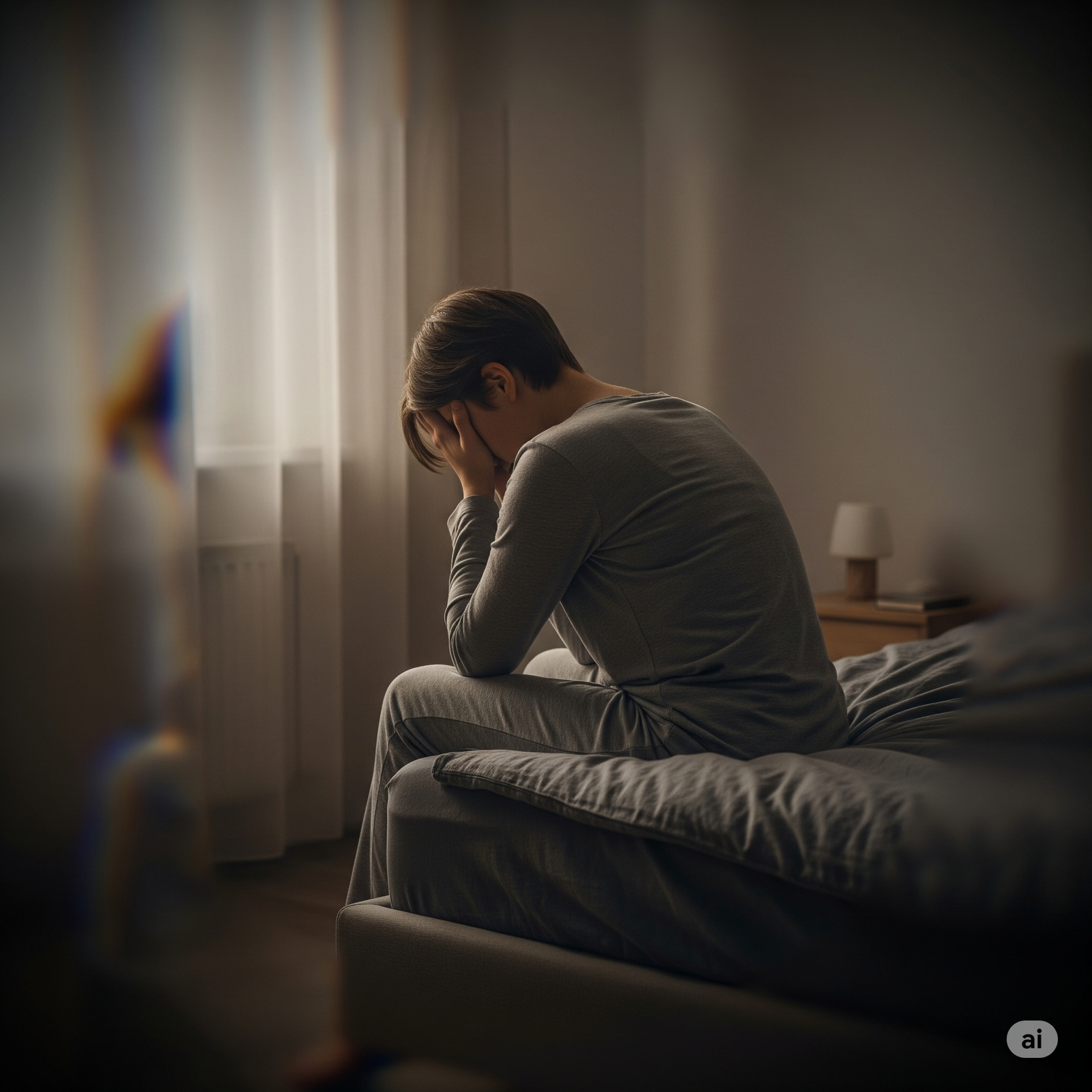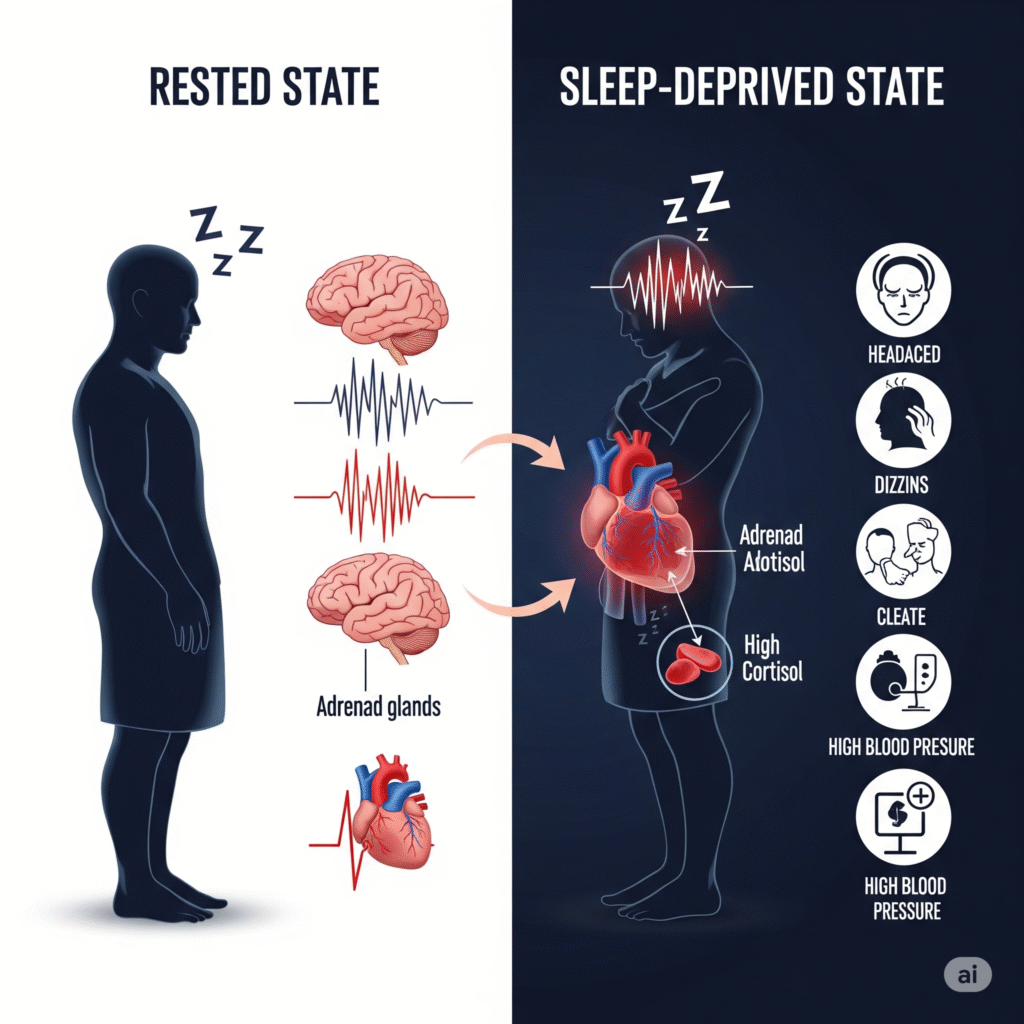Physical Address
304 North Cardinal St.
Dorchester Center, MA 02124
Physical Address
304 North Cardinal St.
Dorchester Center, MA 02124

We’ve all been there. Staring at the ceiling at 3 AM, your mind racing while your body aches for rest. You finally drift off, only for the alarm to blare what feels like minutes later. You stumble through the day in a fog, irritable and unproductive. But what if the consequences of that lost sleep are more than just feeling tired? What if it’s the hidden culprit behind your headaches, acne, or even more alarming symptoms?
You’re not just imagining it. Your body is sending out distress signals. This article will decode them. We’ll explore the immediate and long-term consequences of sleep deprivation and directly answer the urgent health questions you’re asking.
When you miss out on restorative sleep, your body and brain don’t have time to perform their essential overnight maintenance. The consequences can appear faster than you think.
Yes, absolutely. This is one of the most common physical symptoms of sleep debt. Lack of sleep is a major trigger for both tension headaches and debilitating migraines. The exact reason isn’t fully known, but it’s believed to be linked to sleep’s role in managing serotonin and dopamine levels, neurotransmitters that play a key part in pain regulation. When you’re sleep-deprived, your pain threshold lowers, making you far more susceptible to headache pain.
Yes. Feeling lightheaded, off-balance, or dizzy is a frequent complaint after a poor night’s sleep. Your brain’s vestibular system, which controls balance and spatial orientation, is highly sensitive to fatigue. Without adequate rest, communication between your brain, inner ear, and sensory systems can become sluggish and inefficient, leading to that disorienting feeling of dizziness or vertigo.
Yes, it can. Feeling nauseous or having an upset stomach is often linked to the hormonal chaos that sleep deprivation creates. Sleep regulates the hormones that control appetite and stress, including cortisol and ghrelin. When these are out of whack, it can disrupt your entire digestive system, leading to feelings of queasiness and a general sense of being unwell.
The term “beauty sleep” isn’t a myth. Sleep is a critical period for cellular repair and regeneration, and when you cut it short, the effects can show up right on your face and scalp.
Yes. If you notice more breakouts after a few nights of poor sleep, you’re seeing a direct cause-and-effect relationship. Lack of sleep increases the body’s production of cortisol, the primary stress hormone. Cortisol, in turn, signals your skin glands to produce more oil (sebum). This excess oil can clog pores and create the perfect environment for acne-causing bacteria to thrive. Furthermore, sleep deprivation triggers inflammation throughout the body, which can make existing acne redder and more painful.
Yes, it can contribute significantly. Just like with acne, the villain here is stress, specifically the physiological stress that sleep deprivation puts on your body. This stress can push a large number of hair follicles into the “resting” (telogen) phase of their growth cycle. A few months later, you may experience a noticeable increase in hair shedding, a condition known as telogen effluvium. While other factors are involved, ensuring adequate sleep is a crucial step in maintaining a healthy hair growth cycle.
While headaches and acne are frustrating, chronic sleep deprivation can open the door to far more serious health events. Let’s tackle the most alarming questions head-on.
It is possible, though indirect. Fainting (syncope) happens when there’s a temporary drop in blood flow to the brain. Severe sleep deprivation can disrupt your autonomic nervous system, which is responsible for regulating involuntary functions like blood pressure and heart rate. This disruption can make you more vulnerable to conditions like orthostatic hypotension (a sudden drop in blood pressure when you stand up), which can lead to dizziness and fainting. While you won’t faint just from being tired, the extreme fatigue and systemic dysregulation caused by a lack of sleep can create the perfect storm for a fainting spell.

This is a complex relationship. Lack of sleep does not directly cause anemia, which is a condition defined by a lack of healthy red blood cells. However, chronic sleep deprivation can exacerbate or be linked to conditions that do cause anemia. For example, sleep deprivation worsens inflammatory bowel diseases like Crohn’s, which can lead to poor nutrient absorption (like iron) and blood loss. Similarly, chronic kidney disease, which is worsened by poor sleep, affects the body’s ability to produce the hormone that signals red blood cell production. So, while not a direct cause, poor sleep is a significant aggravating factor for anemia-related conditions.
Yes, but not in the way you might think. You will not simply close your eyes and fail to wake up because you were too tired. The danger lies in the catastrophic secondary effects. The CDC has declared insufficient sleep a public health epidemic. Studies from the NIH have shown that chronic sleep deprivation dramatically increases your risk for life-threatening conditions, including:
So, while the final cause of death might be listed as a heart attack or an accident, the root cause could very well be the chronic lack of sleep that led to it.
Understanding the risks is terrifying, but also empowering. You can take control. Improving your sleep isn’t about finding more hours in the day; it’s about improving the quality of the hours you have.
If you consistently struggle with sleep, don’t hesitate to speak with a doctor or a certified sleep specialist. You don’t have to live in a fog of fatigue.
Sleep is not a luxury; it is a biological necessity. It is the foundation upon which your physical health, mental clarity, and emotional well-being are built. Ignoring your body’s need for rest is a high-stakes gamble. By prioritizing sleep, you are making the single most important investment in your long-term health and happiness.